 |
| Atlantic Bottlenose Mother and Calf, with the third one down, keeping its caption (Two male speckled Atlantic Spotted Dolphins pec rubbing). |
| Although dolphins do not usually interact directly with coral reefs, their health is related to the health of the reefs. Coral reefs are important in keeping water quality in the area high; without these reefs, quality may decrease and this can have harmful effects on many species, including dolphins. |
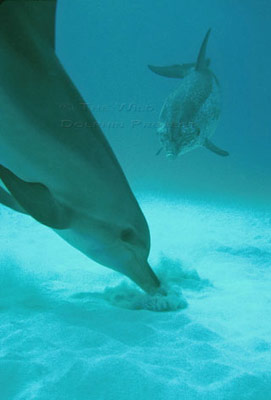 |
Coral reefs are vitally important to the health of all oceans. Corals are a source of primary production, which is the base of the seas’ food web. Reef habitats are important in cycling nutrients and water quality, which are important to all species from the smallest plankton to the largest whales.
A two-toned Atlantic Spotted
Dolphin foraging.
|
Coral reefs are vitally important to the health of all oceans. Corals are a source of primary production, which is the base of the seas’ food web. Reef habitats are important in cycling nutrients and water quality, which are important to all species from the smallest plankton to the largest whales.
Photo: NOAA
|
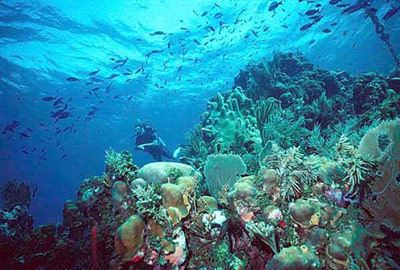 |
Coral reefs also provide habitat for a great variety of fish and invertebrate species. In fact, because of the large biodiversity (1000s of different species) of animals that live on the reefs, they are often called the rainforests of the sea. Fish and invertebrates benefit from the shelter, protection, food and nutrient cycling provided by the reef.
These habitats are also important nursery grounds. Many species use the reefs as protected areas to have and raise young. Without these areas, fish populations could decline, affecting all animals above them in the food chain, including dolphins.
|
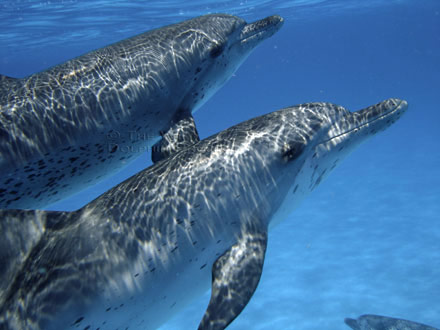 |
| Two male speckled Atlantic Spotted Dolphins pec rubbing |
The animals and plants that make up a coral reef help filter the surrounding seawater; keeping the water with the correct balance of nutrients, minerals and chemicals so that all life can thrive there. Poor water quality, (where the balance is upset in any or all areas) can hurt many of the species living on and around the coral reef, including fish species that dolphins eat. Ultimately, the poor water quality may affect their overall reproduction. This can cause a decline in their population size, thus making it harder for predators, such as dolphins, to find their prey.
There may be increased presence of diseases due to lowered immune systems (makes it hard to fight infection) and it may decrease the amount and/or quality of their prey items. When water quality is poor, there may also be increased chemicals/toxins in the water. Plants and fishes absorb or ingest these chemicals into their bodies and carry them throughout their life. As fish eats plants, then fish eats fish, then dolphins eat many fish, these compounds accumulate up the food chain. Ultimately, through this bioaccumulation, dolphins end up with high concentrations of these harmful compounds in their blubber (their fat). This can cause many health problems and in some cases cause death, either directly or indirectly.
Dolphins are large, warm blooded, air-breathing mammals. They have to remember to come to the surface to breath, so they are constantly swimming – this takes a lot of energy. Dolphins spend a lot of time foraging (looking for food) to obtain the energy they need to survive. Therefore, they are strongly dependent on the amount, distribution and health of their prey. Many of these prey species spend parts of their life on or around coral reefs. Declines in coral reef habitat could lead to declines in fish abundance, which will harmfully affect dolphin populations, making it harder or more difficult to find food (have to spend more energy for smaller amounts of prey).
Coral reefs interact with other oceanic habitats and species to create the delicate balance that is the beauty and diversity of the oceans. Coral reefs play an important role in maintaining a healthy ocean as well as healthy populations of many species (from plankton to dolphins/whales), and it is vital to help protect and conserve these amazing habitats.
|
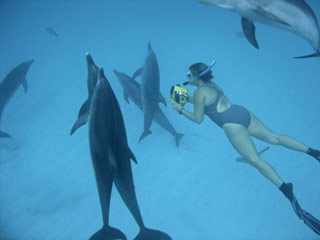 |
Dr. Denise Herzing, Research Director/Founder of The Wild Dolphin Project videotapes a group of Atlantic Spotted Dolphins underwater. Dr. Denise Herzing was recently recognized by the John Simon Guggenheim Foundation as a 2008 Fellow for her continued research and documentation of the Atlantic spotted dolphin.
|
|
|
These dolphin photographs and this article are contributions to Magic Porthole from the Wild Dolphin Project.
Author: Cindy Rogers, M.S. Research Assistant of the Wild Dolphin Project.
You can read more about the Wild Dolphin Project on the Horizon Solutions Site.
Play the Wild Dolphin Project game: kidspage_wordsearch.pdf
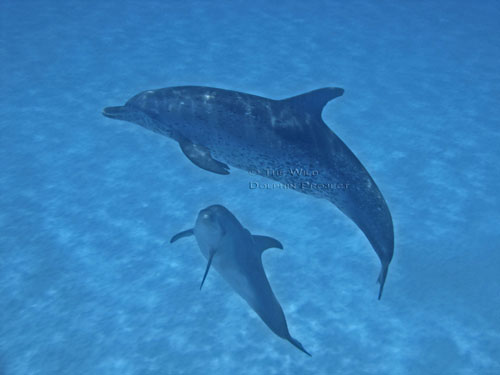
Watch a video of dolphins playing with sargassum, a seaweed, brought to you by Wild Dolphin.
|
|